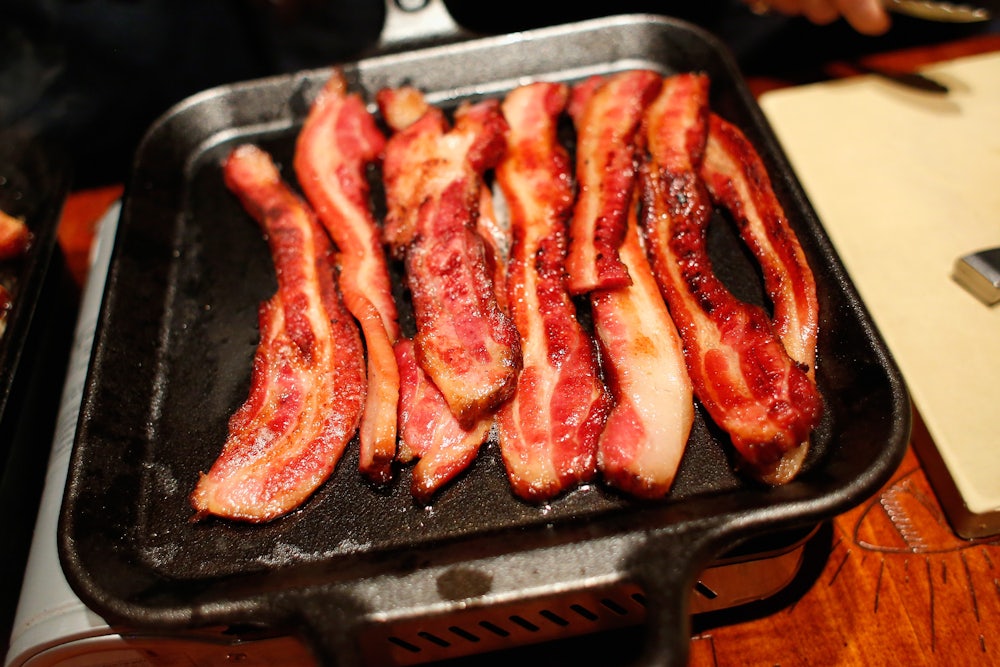Europe, China, and Mexico are taking revenge on President Donald Trump after he imposed tariffs on steel and aluminum imports from those countries last week—and they’re doing it by targeting quintessentially American products. Canada announced retaliatory tariffs on beer kegs and pizza from the United States. And the European Union has threatened to tax imports of blue jeans, bourbon, and Harley-Davidson motorcycles.
But Mexico’s retaliation hits the United States right in the gut. The Associated Press reported last week that Mexico would impose tariffs on U.S. apples, grapes, and, crucially, pork belly, which is where bacon comes from; a tax of 10 percent became effective this Tuesday, and in a month it will rise to 20 percent. The penalty will remain in effect until Trump undoes his steel and aluminum tariffs, the Mexican government said.
Some say the tariffs are terrible news for the U.S. pork industry. “It’s a tragedy if we lose any major portion of our export business,” an agricultural economics professor told Bloomberg last week. “It comes at a bad time.” But what does it mean for the tens of millions of bacon-obsessed Americans?
In theory, a big tariff on U.S. pork belly imports in Mexico would increase the cost of the product in that country, prompting sales to fall. The United States would then export less pork belly, increasing the supply of it in the United States—where, in turn, the cost of it would fall. “[Mexico’s tariff’s] might be good news for U.S. supermarket shoppers buying bacon, at least for a little while,” CNBC reported on Tuesday, adding that it “could lead to more pork supplies staying in the domestic market and lower consumer prices in the short term.”
But pork industry analysts don’t expect that result because Mexicans don’t consume that much U.S. pork belly. “A trade tariff on bellies wouldn’t be very impactful because of the minimal amount we send to Mexico,” said Christine McCracken, the executive director of animal protein at Rabobank, a financial services firm for agribusiness.
It’s impossible to know exactly how much belly Mexico buys from America; data on those sales are contained in the broad category of “other cuts” of the pig. But U.S. bacon appears relatively unimportant to Mexico—so unimportant, in fact, that the Mexican government didn’t even mention pork bellies in its press release announcing retaliatory tariffs, citing instead pork legs and shoulders.
If the United States wasn’t selling much pork belly to Mexico before Trump’s tariffs, it’s unlikely the tariffs would cause enough of a backlog to decrease the price of bacon at U.S. supermarkets. Plus, U.S. consumer demand for bacon is at a record high and still growing, so a larger bacon supply might even be a good thing—especially as August approaches. “The trade situation probably will not affect bacon markets all that much,” said Dan Vaught, a senior livestock economist at Doane Advisory Services.
But the Mexican tariffs might impact the cost of other cuts of the pig. Mexico bought 575,434 metric tons of U.S. pork shoulder and bone-in ham last year, at a value of $946 million. The popularity of those products alone has made Mexico hugely important to American pork producers. “We ship more pork to Mexico than anywhere else in the world,” said Erin Borror, an economist at the U.S. Meat Export Federation. (The second-biggest buyer is China, which imposed retaliatory tariffs on U.S. pork in May; the two countries combined account for more than half of all U.S. pork exports.)
If Mexico’s tariffs drive up the cost of bone-in ham in Mexico—and thus drive down demand there—it could create a glut in America, causing the supermarket price of the product to fall. McCracken speculated that ham sales could skyrocket during Thanksgiving and Christmas, and that sales of turkey could suffer. “Those two typically compete over the holidays,” she said. “But it’s probably a little too soon to tell.”
The potential for cheaper ham or bacon might sound like a positive effect of Trump’s flirtation with a trade war. But to American pork producers, who are already grappling with China’s 25 percent tariff, it’s an existential threat. “These are markets that the American heartland depends on for economic survival,” Brian Kuehl, the executive director of Farmers for Free Trade, said in a statement. “These tariffs will harm U.S. farmers and take many American farm operations to the breaking point.”
Vaught said Mexico and China’s tariffs would likely have to be in place for years to do serious harm to large-scale pork producers. “The industry is sort of like an aircraft carrier,” he said. “You can’t turn it around on a dime.” But the tariffs may well be in place for years, given Trump’s apparent dedication to a protectionist trade policy. And despite the potential for cheaper groceries in the short term, consumers of pork shouldn’t be optimistic either. “If we start seeing these huge negative impacts from trade, it will eventually hit [the consumer],” Borror said. “Any time the market is interfered with, it’s always negative.”
McCracken is less convinced of any long-term negative impacts for pork producers as a result of the tariffs, but she agreed that American consumers may eventually feel the pinch. “In the long run, the industry will correct, and we’ll have higher costs of meat going forward,” she said. “So I guess, stock up.”
